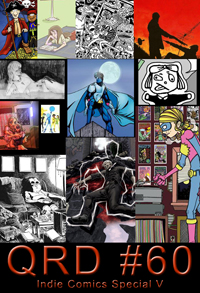
 |
| about
this issue Indie Comic Creator Interviews: Mike Dawson Floyd Lewis A.P. Fuchs Darin Shuler Trevor Denham Jules Rivera John Steventon Lorenzo Ross John Allison Michael San Giacomo Matt Chic Jackie Crofts Don W. Seven Derek Baxter Interview Series Updates: Nate McDonough Jason Dube Brian John Mitchell |
 |
 |
 |
 |
 |
 |
|
|
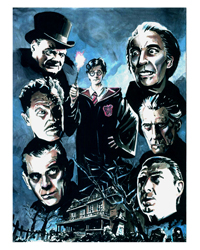 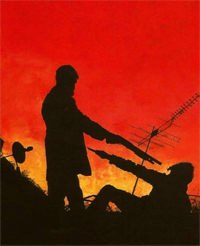 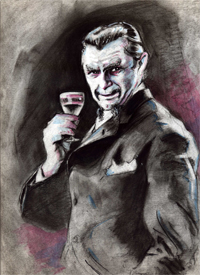 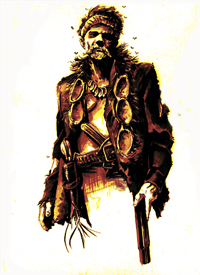 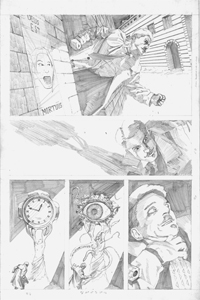 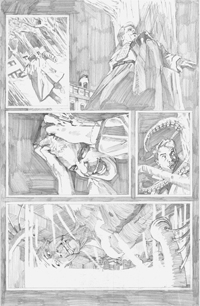 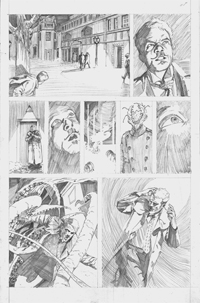  |
April 2013

City: St. Petersburg, FL
Comics: The Body Broker, Dues est Mortuus, A Man Comes Around
Websites: www.trevordenham.blogspot.com
QRD – How old were you when you first got into comics & did you always stick with them or did you come back to them?
Trevor – I liked comics as a kid & I got caught up in the Image craze of the early 90s. In high school I continued to draw, but comics took a backseat. While in the Marines, I picked up a Batman at the PX & read it out in the field, then my First Sergeant stole it, read it, & I never saw it again.
A few years later, I caught of glimpse of Captain America drawn by Hitch, bought that, then found the Brubaker/Lark run, & I was back into comics. I really latched onto the field while at the Ringling College of Art & Design; where my instructor, Eisner winning artist, George Pratt, opened my eyes to the world of illustration.
QRD – What was the first comic book you ever bought?
Trevor – My dad bought me Semper Fi #1, Tales of the Marine Corps in 1987 or 88. John Serverin was the artist & I copied his work as a kid. I remember one of the panels was a Navy Corpsman getting shot in the neck. Great stuff for a kid. I am one of the few out there that can say comics made me want to be a Marine.
QRD – How old were you when you put out your first comic?
Trevor – Still working on it. Every time I sit down to self-publish, an illustration job comes up & since it pays the bills, I work on that. Anything I want to do gets pushed on the back burner. That, & I have delusions of grandeur. My book has to be so this & so that, & so blah blah blah. Just publish it already. Well, I’m getting there.
QRD – What decade do you think produced the best comics?
Trevor – From 1950 to the mid 80s. EC set the bar high. Warren picked up those artists & even brought in the Spanish, Italian, & Philippine artists. Britain came out with guns blazing with 2000 AD & Battle Picture Weekly. There are hundreds of great artists out there now, & I will sing their praises all day long, but they wouldn’t be where they are today, if it wasn’t for the greats.
QRD – Why comics instead of just writing or drawing?
Trevor – Comics give you the best of both worlds. You can tell a great story & get your point across. George Pratt did it with Enemy Ace: War Idyll. That book was mandatory reading at West Point, because it is a great story. Art Spiegelman created Maus, a tale of the Holocaust, as did Joe Kubert with Yossel. Those are significant events in history, & it was put into a format that anyone can enjoy. One of these days, a fully-fledged comic or graphic novel will win the Pulitzer Prize.
QRD – Do you see mini-comics & indie comics as paths to mainstream comics or as their own unique media?
Trevor – I’m not sure I really care for mainstream comics. Granted, your name gets put out there, but the pay may not be the greatest & you don’t get treated all that well. I’ve asked a few mainstream artists at cons & they all agree on those points. I would rather have my cake & eat it to. Chances are I die in obscurity, but at least I did it my way. Yes, I just stole from Sinatra & if it’s good enough for him, it’s good enough for me.
QRD – How many copies of your comic do you print in your first run?
Trevor – 50. A nice even number. If you can move 50 units & make a profit, then you’re doing something right & you can make sizable adjustments. If it’s a bust, you lost maybe $200 in printing costs. So you get a regular job & make it up.
QRD – How much do you think comics should cost?
Trevor – For my own, no more than $3. You have to take into consideration what Marvel & DC sell theirs for & you have to look at the fact that right now, you’re a nobody, so people might be leery to spend money on you. I’ve had it happen to me. I was selling my sketchbook at a con for $15, then $10, by the end of the show I was giving them away just so I could get my name out there.
QRD – How many books do you produce a year & how many would you like to?
Trevor – I would like to produce at least 6 or 7 books a year, but it ain’t happening.
QRD – Do you think stories should be serialized or delivered as complete works?
Trevor – It depends on the story. If you want cliffhangers, then serialize it. If it is a complete work, then one volume.
QRD – How are comic strips different than comic books & which medium do you prefer?
Trevor – Comic strips are what you get in the Sunday paper. Those are the cliffhangers. Best examples are Prince Valiant, Flash Gordon, Secret Agent X-9, Terry & the Pirates, etc… I enjoy both styles. I still read Valiant in every Sunday paper (& I wish Gianni was still working on it), but I like my comics as well. Not crazy about the slicks though. Too many ads I have to put up with & it interrupts with the flow of the story. Just another reason I like independent stuff.
QRD – How long is it from when you start a comic until it’s printed?
Trevor – As soon as I print one, I will let you know.
QRD – What do you do better with your comics now than when you first started?
Trevor – I draw much better now, I can tell you that. For the longest time, I wanted to be Joseph Clement Coll. He was an illustrator at the turn of the 20th century & he had this way of using lines. He was a genius & what he came up with, without the aid of reference, is still mind blowing! In my opinion, he is the greatest artist off all time. Better than Vermeer, Rembrandt, Pyle, Wyeth, everyone. It took me a while to notice that I really stunk at trying to be him. I couldn’t ink like he could. I couldn’t master the line work, the dynamics, nothing. So, after a few years, I learned from Angelo Torres, who broke drawing down into basic shapes. & there is a great quote from Wally Wood: “When in doubt, ink it out.”
QRD – Do you do thumbnails?
Trevor – Yes. Thumbnails help visualize the entire page & even if I have to do 20 or so, at least I figure out what I want.
QRD – At what size do you draw?
Trevor – I draw my pages on 11 x 17 Bristol or watercolor paper.
QRD – What kind of pens do you use?
Trevor – I use Speedball ink & Princeton brushes. If I need to use pens, it’s mostly good old-fashioned ballpoint pens & Sharpies.
QRD – What does your workstation look like?
Trevor – Desk, small two shelved table for all of my goods, two full book cases full of comics & illustration books, a computer so I can watch films like Kelly’s Heroes & The Wild Bunch while I ink. I have a scanner too.
QRD – At what point in the artistic process do you work digitally?
Trevor – When I finish a page, I will scan the image in & adjust levels with the scanner. That’s about it.
QRD – What do you think of digital comics & webcomics?
Trevor – Anyway to get your work out there is the best way.
QRD – Do you prefer working in color or black & white?
Trevor – Black & white in comics, but single illustrations should be in color. Maybe not a full blast color, but a strong splash of color is brilliant.
QRD – How many different people should work on a comic & what should their jobs be?
Trevor – As many as it takes. I prefer to be my own writer/ artist/ colorist/ letterer. But, if someone is willing to do the letters, I will definitely let them have it.
QRD – How do you find collaborators?
Trevor – They usually find me through referrals or Google. I don’t know what they type in, but whatever it is, it works. Thanks, Google!
QRD – How tight do you think a script should be as far as telling the artist what to draw?
Trevor – It’s weird, when I write, I keep it fairly sparse. Example:
AT BAR. NIGHTTIME. DRINKING A BEER. MAN LEANS IN CLOSE.
CAP: But, after a director’s conference, I met someone who planted a seed in my mind.
MAN: …A brain alone will net you $1,200.
And if someone else writes it, I like it to be the same. Give me the basics, & what is mandatory in the shot, & I will make sure it gets there.
QRD – What comic book person would you be most flattered to be compared to?
Trevor – Angelo Torres.
QRD – What do your friends & family think of your comics?
Trevor – I get positive reviews about the art, but sometimes the stories… not so much. It’s usually the dark overtones that get met with jeers, but sometimes that’s what people like. I have a good friend who has no problem telling me when something doesn’t work. If I have a figure who doesn’t look right, he’ll say so. So does my fiancée, Stacey, she is very supportive of what I do, & even if I think I have gone too far with a particular panel, she has no problem with it. But she too will let me know if a certain drawing doesn’t work. It’s wonderful.
QRD – What do you think of superheroes?
Trevor – Some guy running around in panties? No thanks.
QRD – Marvel or DC?
Trevor – Neither. EC. Mr.’s Gaines & Feldstein created something perfect, & it only lasted four years & look at the legacy it has. James Warren also created something wonderful with Creepy, Eerie, & Vampirella. That lasted, what, fifteen years, & isn’t as well known, but it is just as influential.
QRD – What comic characters other than your own would you like to work with?
Trevor – The Crypt-Keeper, the Vault-Keeper, the Old Witch, Uncle Creepy, Cousin Eerie, Judge Dredd, The Rocketeer, The Shadow, Indiana Jones, Robocop - you know, all of the cool ones.
QRD – Ideally would you self-publish?
Trevor – Yes. I will self-publish something sometime soon.
QRD – What conventions do you try to attend & why?
Trevor – I have attended comic & horror conventions. It seems to be the place to sell yourself to my target audience. Sometimes it’s a win, sometimes, it’s a bust.
QRD – What do you do to promote your books?
Trevor – Aforementioned conventions, social media, friends (word of mouth), Google, bribes…
QRD – Do you think your comics are well suited to comic shops or would sell better elsewhere?
Trevor – I think my work would sell in shops. Granted, it might get lost with the hundreds of titles out there right now; but once I establish myself, I don’t see why my books couldn’t hack it with the others.
QRD – What other medium would you like to see some of your comics made into (television, film, games, action figures, etc.)?
Trevor – Let’s keep it small for now. I just want to get into comics now. I will worry about the rest of it later.
QRD – Do you consider yourself a comic collector or a comic reader or both?
Trevor – I’m definitely both. The comics I do collect, I read. Screw the bagged idea that you can never open it. That’s just dumb. Comics are meant to be read. Even if I had Amazing Fantasy #15, I would read it; then bag it, because I want my $40,000.
QRD – What do you see as the most viable mediums for comics distribution 10 years from now?
Trevor – Hopefully, it will still be print. Even though books can be read on Kindle & Nook, or online, I still love being able to hold a book in my hands.
QRD – What would you like to see more people doing with comics?
Trevor – That’s a tough one. I honestly don’t know.
